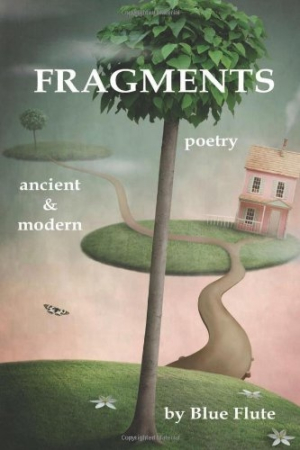Fragments
Poetry Ancient and Modern
One of the pleasures of anthologies is that the reader is usually exposed to new material, or at least prodded to see old material in a new light. Fragments: Poetry Ancient & Modern, an anthology selected by the pseudonymous Blue Flute, delivers in both categories.
Fragments is divided into two parts: older poetry—some truly ancient, some as recent as the first half of the twentieth century—and modern, which seems to be exclusively twenty-first century work. The older poetry is well selected and multicultural, representing ancient Israel, Greece, and Rome, as well as later poetry from Italy, France, the Spanish world, the English world, China, and Japan. Blue Flute seems partial to Japanese haiku, tanka, and haiga (the art of combining paintings with short poems), but the non-Asian poetry selections are not present just to fill categories: Rimbaud, Chaucer, and Eliot all make appearances.
Some of the poets in Fragments are probably unknown to many readers but are deserving of greater recognition—among them Giacomo Leopardi, Li Bai, and the master of haiku, Matsuo Basho. Amazingly, Blue Flute translates all of the poems from ancient Rome, Italy, France, the Spanish world, China, and Japan with only an assist from contributor Yiota Karioti on the ancient Greek poems. The translations are simple and graceful, and even those “translated” from Old English to modern English are well done and enhance the reading experience. Better yet, each poem is presented along with the original untranslated text for multilingual readers who want to compare. An excellent example can be found in the Japan section, where Blue Flute takes Basho’s poem and first translates this way: “Honest and sincere was he— / The dog was trampled upon / By a cat in heat.” He then presents the original Japanese, along with a pronunciation guide and “literal notes” that give insight into the art of translation.
Despite the daunting precedent of the first half of Fragments, the modern poetry section is less so. Twelve poets from several nations are represented. Readers will find many sublime moments in reading their work, as in Sandi Pray’s “Micropoetry”: “the red berries parted / to become / a little bird.”
The book does fall flat with some of the modern haiga, which, with their short, mysterious, inspirational messages (“sometimes foolishness is wise”; “when I stopped following I learned to fly”) laid over pleasant but uninspiring photographs, can resemble the motivational prints found in office meeting rooms everywhere. But these are few, and they barely detract from an otherwise exceptional book.
Fragments: Poetry Ancient & Modern would make an outstanding addition to a poetry library, or a good first volume to begin one. Blue Flute shows not only where poetry has been, but just as importantly, where it can go.
Reviewed by
Peter Dabbene
Disclosure: This article is not an endorsement, but a review. The publisher of this book provided free copies of the book and paid a small fee to have their book reviewed by a professional reviewer. Foreword Reviews and Clarion Reviews make no guarantee that the publisher will receive a positive review. Foreword Magazine, Inc. is disclosing this in accordance with the Federal Trade Commission’s 16 CFR, Part 255.

